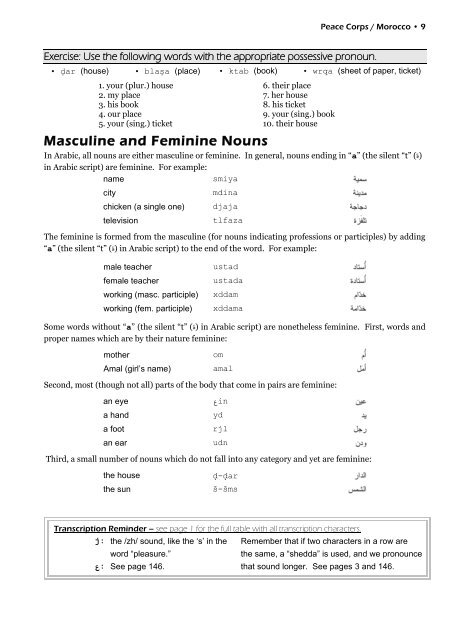Moroccan Arabic textbook 2011
Moroccan Arabic textbook 2011
Moroccan Arabic textbook 2011
Create successful ePaper yourself
Turn your PDF publications into a flip-book with our unique Google optimized e-Paper software.
Peace Corps / Morocco • 9<br />
Exercise: Use the following words with the appropriate possessive pronoun.<br />
• dạr (house) • blasạ (place) • ktab (book) • wrqa (sheet of paper, ticket)<br />
1. your (plur.) house 6. their place<br />
2. my place 7. her house<br />
3. his book 8. his ticket<br />
4. our place 9. your (sing.) book<br />
5. your (sing.) ticket 10. their house<br />
Masculine and Feminine Nouns<br />
In <strong>Arabic</strong>, all nouns are either masculine or feminine. In general, nouns ending in ―a‖ (the silent ―t‖ ( )<br />
in <strong>Arabic</strong> script) are feminine. For example:<br />
name<br />
smiya<br />
city<br />
chicken (a single one)<br />
television<br />
mdina<br />
djaja<br />
tlfaza<br />
The feminine is formed from the masculine (for nouns indicating professions or participles) by adding<br />
―a‖ (the silent ―t‖ ( ) in <strong>Arabic</strong> script) to the end of the word. For example:<br />
male teacher<br />
female teacher<br />
working (masc. participle)<br />
working (fem. participle)<br />
ustad<br />
ustada<br />
xddam<br />
xddama<br />
Some words without ―a‖ (the silent ―t‖ ( ) in <strong>Arabic</strong> script) are nonetheless feminine. First, words and<br />
proper names which are by their nature feminine:<br />
mother<br />
Amal (girl‟s name)<br />
om<br />
amal<br />
Second, most (though not all) parts of the body that come in pairs are feminine:<br />
an eye<br />
a hand<br />
a foot<br />
an ear<br />
inع<br />
yd<br />
rjl<br />
udn<br />
Third, a small number of nouns which do not fall into any category and yet are feminine:<br />
the house<br />
the sun<br />
ḍ-dạr<br />
š-šms<br />
Transcription Reminder – see page 1 for the full table with all transcription characters.<br />
j: the /zh/ sound, like the „s‟ in the Remember that if two characters in a row are<br />
word “pleasure.”<br />
the same, a “shedda” is used, and we pronounce<br />
See page 146. :ع<br />
146. that sound longer. See pages 3 and


